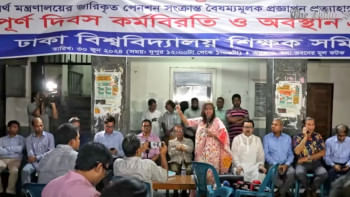Is forcing our educators to resign the right way to go?

Following the resignation of Sheikh Hasina, the dissolution of parliament, and the formation of the interim government, we've been witnessing a massive change in university administrations all around the country. Vice-chancellors, pro-vice-chancellors, proctors, registrars, provosts and other members of university administration bodies have stepped down from their positions, mostly citing personal reasons behind their resignation. However, it's quite evident that the decision was made under pressure, particularly from students and teachers.
The active participation of students in demanding the resignation of VCs and other admin body members comes as no surprise. The nine-point demands put forth by students during the quota reform movement called for the resignation of VCs and proctorial bodies of Dhaka, Rajshahi, and Jahangirnagar universities. As VCs of the universities, their response to violence on students by law enforcement and Bangladesh Chhatra League members was not only inadequate, but it actively placed the students in harm's way. The situation was similar in many public and private universities throughout the country, where members of the admin body endangered the lives of students by refusing accommodation and support.
Following universities, students of schools and colleges also called for a change in their respective governing bodies, urging the resignation of principals and teachers based on misconduct during and before the protests.
While peacefully demanding the resignation of faculties and teachers is a justifiable right, the mob mentality borne out of it crossed a line. Administrative personnel had to step down under duress, often leading to disruptions in the educational institutions. A video of high school students trying to physically force the principal of a school to sign her resignation surfaced on the internet, which garnered criticism online.
During the Awami League (AL) government regime, most members in high positions at educational institutions were often affiliated with the political party, which has served as an incentive for students and staff to demand their resignation. Cases emerged of governing body members misusing their position to accept bribes, embezzling research funds, being involved in corruption, etc. While demanding justice for those guilty of such wrongdoing is fair, being affiliated with a political party alone shouldn't warrant such claims.
Rather than jumping the gun on demanding resignations, we need to step back and re-evaluate whether those in administrative positions are qualified enough. Someone should not be banned simply for their ties to the AL without evidence of misconduct, considering the political climate before the protests.
The forced resignations have led to an administrative vacuum in universities, causing delays in the resuming of classes, payment of the staff's salaries etc. The University of Dhaka has appointed Professor Niaz Ahmed Khan as the new VC. Pro-VC and proctorial positions have also been filled, and the student opinion so far is rather optimistic. This isn't the case in many other universities, where academic activities are halted, setting students back.
The administrative body members' first and foremost duties should be creating a sound structure for academics and protecting the students' interests. The politicisation of these positions made way for corruption. Student politics and the violent nature of it were also overlooked. Combinedly, these caused the students' interests to take a backseat.
Recent events have created a shift in the teacher-student dynamic in general. Since childhood, we've viewed our teachers as role models not only in academics but also in principles. The teachers, in turn, were to treat students with affection and guide them towards the moral path. Self-serving politics and corruption from the teachers' ends have disrupted this relationship and altered the students' perceptions, dampening their respect for educators. It is this very shift in dynamic that has caused students to lay hands on their teachers and force them to resign. This damage needs to be repaired.
Many consider the resignation of administrative staff a necessary step in reformation as they believe having apolitical persons in charge will bring about progress. That being said, forced resignations can create unforeseen circumstances and make way for unqualified candidates to assume positions of power. Persecution of teachers and forceful resignation not only expels qualified individuals but also reflects badly on students.
Students have expressed dissatisfaction at the news of Khulna University's VC Mahmood Hossain's resignation after his bold stance in protecting the students during the movement. So, it's obvious that the general expectation is that our educators will have our best interests at heart. We want to see a positive change in administration where student welfare and education quality are prioritised, research scopes are expanded, and resources and facilities are modernised and made accessible for students.
Resignation of corrupt individuals is indeed a necessary step in building a better education system, but it is up to us—students—to not give into mob mentality and ensure justice is done towards our educators.
Zabin Tazrin Nashita is an engineering student at Islamic University of Technology.
Views expressed in this article are the author's own.
Follow The Daily Star Opinion on Facebook for the latest opinions, commentaries and analyses by experts and professionals. To contribute your article or letter to The Daily Star Opinion, see our guidelines for submission.

 For all latest news, follow The Daily Star's Google News channel.
For all latest news, follow The Daily Star's Google News channel. 









Comments